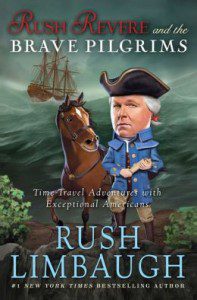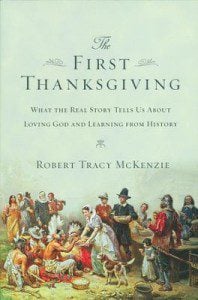Americans generally view Thanksgiving as an idyllic affair. Kind Indians wearing paper feathers teaching black-and-white clad Pilgrims to survive in the New England wild. Sitting down to eat tryptophan together. And celebrating, if Rush Limbaugh is to be believed in his just-released book Rush Revere and the Brave Pilgrims, that “capitalism and Scripture saved the day.” It would be easy to rest easy in these cultural myths as we gorge on turkey, slump on our reclining chairs, and watch the Packers and Lions. But in The First Thanksgiving, Robert Tracy McKenzie has flipped the bird–questioning whether there was even turkey at the feast at all. Thanks, professor, for ruining our national celebration of gluttony, liberty, and free enterprise.
- Neither the Pilgrims nor the Natives were good-hearted multiculturalists. It turns out that Squanto, who helped the Pilgrims through their first awful winter in the New World, was not such an affable philanthrope. He was playing the Pilgrims and Wampanoag against each other. And less than two years later Governor Bradford decorated a fort with the head of a Massachusetts Indian in order to provoke “terror unto others.” The cultural clashes continued long after. A full-page advertisement for Marshall Field and Company in 1920 featured a Pilgrim standing on Plymouth Rock with a sea of immigrants entering through Ellis Island. The text warned, “Do they bear the precious ore of the early Pilgrims, or the dross of the disturber?”
- Pilgrims were not free-market democrats. It’s anachronistic to understand the English Pilgrims as free-thinking patriots 150 years before the founding of the nation. McKenzie points out that a democratic ethos of “the people” ruling was still a good two centuries away. Nor were they proponents of modern forms of free enterprise—or of socialism, for that matter.
- Historians can’t draw a straight line between the first Thanksgiving in 1621 and the contemporary holiday. For 220 years, nobody even remembered the first Thanksgiving. (Historical records only give us the barest of sketches: “many of the Indians coming amongst us, and among the rest their greatest king Massasoit, with some ninety men, whom for three days we entertained and feasted”). It was a holiday, but it wasn’t linked to the Pilgrims until the mid-19th century. The Bible Belt, in fact, despised Thanksgiving because of sectional rivalry. It took the growing popularity of football in the 1870s and 1880s, when the first league held its championship game on Thanksgiving Day, to accelerate the holiday’s popularity. Thanksgiving, McKenzie writes, became “a domestic observance for which church attendance was optional but a plump turkey was not.” The pious “memories” of the typical evangelical are less accurate than a 1908 Budweiser ad in the Chicago Daily Tribune that read, “How the Pilgrims would have enjoyed Budweiser. How they would have quaffed it with heartfelt praise and gladness of heart.”
- And perhaps most shocking to our holiday sensibilities, the first Thanksgiving almost certainly featured more eel than turkey. If they ate any birds at all, they were probably geese. There were no sweet potatoes, cranberry sauce, or pumpkin pie. If you really want to be historically authentic, eat some turnips and eel this Thanksgiving. McKenzie also points out that the quaint image of Pilgrims as broad-shouldered pioneers wearing shiny buckles, black suits, and white collars has been “conjured
 out of thin air.” The Pilgrims probably looked more like junior high schoolers: five feet, six inches and about 130 pounds and clothed in an exuberant array of reds, blues, greens, and yellows.
out of thin air.” The Pilgrims probably looked more like junior high schoolers: five feet, six inches and about 130 pounds and clothed in an exuberant array of reds, blues, greens, and yellows.
But McKenzie is doing much more than deconstructing myths. In the end, this terrific book is less about the first Thanksgiving than a Christian meditation on the meaning of the past. He stresses how different postmodern Americans are from the Pilgrims. He points out that our historical narratives tell us more about the era in which they were written than the era they’re about. He warns us about the egotism of providentialism, anachronism, and pronouncing moral judgment on people from the past.
It’s a shame that this profound and accessible book notable for its nuance and historical thinking won’t come close to approaching the sales of Rush Limbaugh’s demagogic histories. As of today, Amazon’s book rankings show McKenzie at #26,544, which really isn’t so bad for an academic. Limbaugh, by contrast, comes in at #5.
















